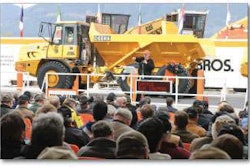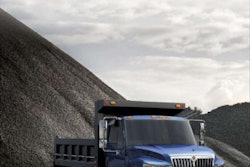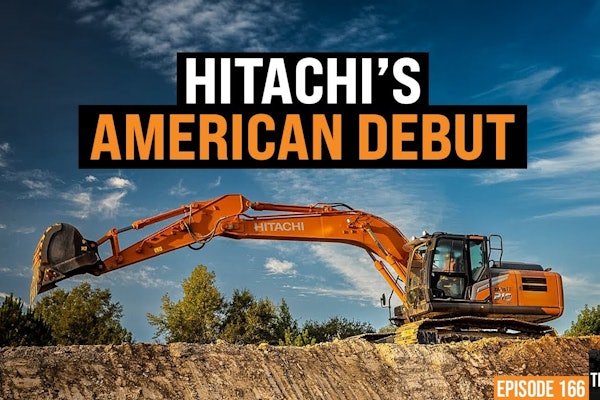Son carries on in the firm he and his father started together
By Marcia Gruver
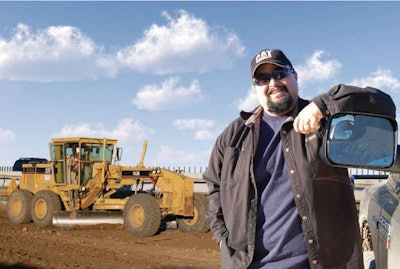
Ryan Chavez
Weston, Colorado
Felix Chavez & Son Construction
Year started: 1990
Annual volume: $8 million
Number of employers: 80
Markets served: Earthmoving and utility work for oil field companies and highway contractors.
While the usual progression in construction is for a parent to hand down a company to a child, the start of Felix Chavez & Son Construction (FC&SC) adds a new twist to that formula. In 1990, while still in high school, son Ryan convinced his father Felix to go into business. Felix had the engineering degree and reputation after years of working in the surrounding oil fields. Ryan had the youth and enthusiasm and a passion for working outdoors and around equipment.
The company had a hard scrabble start. Ryan made sure he did his homework at school so he could work in the evenings. The oil field backhoe work they relied on dried up in 1991, so the two started putting in everything from septic tanks to driveways, surviving until oil field work returned. “We’d run the backhoe during the day and one of us would run the blade and then at night would switch off sleeping in the truck,” Ryan now says.
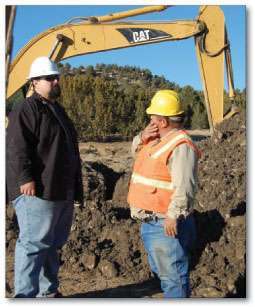 Ryan takes a hands-on approach to his jobsites, visiting each one and observing operations.
Ryan takes a hands-on approach to his jobsites, visiting each one and observing operations.Felix, who passed away this past summer, kept a keen eye on markets, at one time buying almost an entire fleet of equipment – three excavators, two dozers and four backhoes – at once so the firm could take on new pipeline work. “It’s what made us grow into the company we are today,” says Ryan, who shakes his head at his company’s current $8 million size. “I guess when you have your head down you just don’t look at where you’re at. It’s been 20 years since my dad and I started and it seems like yesterday when we were working around the clock.”
You almost get the feeling that tiny Weston – in-town population hovering around 300 – is FC&SC. The company takes up two of the corners of the town’s main intersection; and a family-owned concern, Weston Supply – which serves as post office, café, general goods and Carhartt outlet – occupies another corner.
It’s where Ryan grew up. He attended kindergarten through sixth grade in the former elementary school that now serves as the firm’s offices. Felix went to the same school, and Ryan’s grandfather was a stonemason who helped construct the building.
Looking for bottlenecks
FC&SC does dirt work, utilities, trucking and oilfield work for a variety of clients, including XTO Energy, Summit Gas Gathering, Pioneer Natural Resources, Lawrence Construction, Ames Construction and Kirkland Construction. “Really, we do almost anything,” Ryan says.
His 55-truck fleet allows him to be more flexible in his geographical range, giving him needed agility in the downturn. “I knew I couldn’t just stay around here and rely on just one industry,” Ryan says. And so he’s got a crew working on a highway job in Kansas, and there’s talk of following a contractor to Phoenix. “I’ll go anywhere,” he says. “You have to be willing to pick up and leave if you’re going to develop a reputation with these companies.”
The reputation he craves is “the ability to move more dirt than anyone else,” Ryan says. “It’s a challenge, shaving times off loads.” Ryan’s tricks of the trade? First, make sure your equipment fleet is well maintained. (More on that later.) Then observe the operation at hand, looking for bottlenecks or inefficiencies.
For example, on a recent road job, Ryan saw that a silt fence operation next to a railroad track was crowding his trucks. “It was hard for them to turn around,” he says. “I talked to the general contractor’s safety guy, and we actually got the operation moved further away from the tracks, which made it safer. Just by changing how the trucks came in meant they only had to back up once to dump their load and we saved about four minutes per load.”
Ryan tries to pass along his sharp production eye. “I tell my drivers to look at how they can make an operation better, and see at how they can haul even one more truckload a day. If they can do it without increasing their fuel usage, you’re making money.”
Maintenance equals money
Ryan maintains attention to maintenance has allowed his firm to exceed recommended intervals for repowers, rebuilds and overhauls. “This saves us money, because we don’t have the breakdowns. It’s the breakdowns that are expensive, not the parts and not the mechanics.” He also believes in a standardized fleet, running Cat equipment and primarily T800 Kenworth trucks. And he plans to buy 10 to 15 used trucks this year, since that route still allows him to get the Cat engines with which his mechanics are familiar.
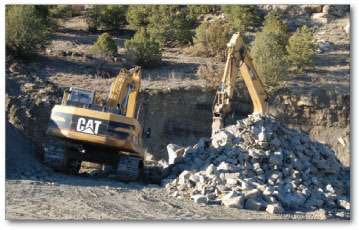 At a company site in Pichoricks Canyon, excavators break up rock to place as riprap for Pioneer Natural Resources.
At a company site in Pichoricks Canyon, excavators break up rock to place as riprap for Pioneer Natural Resources.When it comes to equipment, Ryan is a firm do-it-yourselfer. The former gym in his converted elementary school office contains his parts inventory, rows of fan belts, starters, alternators, hoses, filters, even worn bucket teeth. “While they’re no longer good for shale or hard dirt, they’ll still work in cobblestones where you don’t need the sharpness,” Ryan says. “That way you get more life out of them.” He’s in the process of aligning his company’s inventory with Cat dealer Wagner Equipment’s parts system. “That way, our system can call their system and order any parts, and they’ll be at the drop box the next morning,” Ryan says.
The company stocks extra radiators, rear ends and transmissions for its trucks. “That’s part of being able to produce more,” Ryan says. “We have the stuff in place so we can change a rear end out in a matter of three hours.”
The company’s main shop is catty corner from his office operation, and it maintains locked equipment storage areas on acreages between his office and the city of Trinidad, about a half hour away.
This attention to maintenance is critical when he sends off trucking crews to other states. The company fleet includes a van trailer containing additional parts, and a cargo trailer with extra tires. Ryan is also considering a mobile shop since he wants to have the ability to quickly repair a truck close to his jobs. He relies on established local relationships to get the same service from branches in a new area. Since the company only uses two types of rear ends for its dumps and side dumps, the Kansas City branch of his local supplier stocked them for FC&SC.
In 2008, the company ran 21 water trucks that started life out as tractor trailers. Ryan put the fifth wheels back on in 2009 to make them more versatile. “And I kept the water tanks because if the oil companies start drilling again, we’ll start hauling more water and it’s easier to find a tractor trailer than it is to find an 80-barrel truck that’s equipped the way I want it.”
For the past six years, Ryan has been bolting a half-inch plate down his truck frame, to which he mounts pumps, toolboxes and chain racks. “Everything is welded to the plate, not the frame, and we’ve had no frame cracks. And if we take the plates off, there’s been no modification to the frame,” which can be important in a resale. The idea was prompted by a truck the company had to modify to work in the oil fields, which required the addition of an 8,000-pound pump. “My father, our mechanic and I were trying to figure out how to mount it on the frame without running the risk of cracking it,” Ryan says. They settled on using the frame’s pre-drilled bolt holes to bolt the plate on one side of the frame and run the plate underneath the cab. “Now we can put anything we want on it without damaging the truck,” he says.
Fleet realignment
Maintenance is especially key now that FC&SC is running an older-than-usual fleet. Ryan made the hard decision in early 2009 to sell all the machines for which he was still in debt. All the older equipment the company owned had been well maintained, but the 2009 used equipment market wouldn’t fetch the prices the company needed to pay off its newer equipment. “And I couldn’t see getting rid of three quarters of my fleet to try to keep a quarter of it, and yet still owe money,” Ryan says.
Ryan’s package of machines interested Ritchie Bros. Auctioneers, in part because of the company’s meticulous maintenance records and oil sampling. Ryan made a deal with Ritchie and came out $200,000 over what he owed.
In addition to this sale, the company has been refinancing some of his trucks, and is starting to lease his 40-plus company pickup fleet, all Ford 250s to 550s.
Ryan says the experience has taught him some lessons. “I now understand that we were kind of wasteful in our equipment spending. We shouldn’t have bought as much, and rented a bit more. There was a tendency at the time to just say, ‘Oh, let’s go ahead and buy it, that way we’ll have it.’ I’m looking at this as a positive thing because it’s gotten us back to running leaner. You need to make sure everything makes sense.”
His fleet now includes D4 through D8 dozers, 320 through 325 excavators, seven graders, and five loaders. Ryan recently decided to buy a GPS system for two dozers and a grader, and he’s figured out a way to position the base station on his jobs. “We’re mounting it on a skid so we can use it on any of our winch trucks. Then we can just winch it into place and move it where we need to, and it’s secured to the truck,” he explains.
“They are a top notch operation with very well maintained equipment and good operators,” says Baxter Kirkland with Kirkland Construction. “They are very skilled at what they do.”
Family roster
As with many construction companies, FC&SC has a full family roster. Wife Tina serves as the company’s safety coordinator and “my right hand,” as Ryan puts it. Tina’s father and mother also work for the firm, as do Ryan’s sister and aunt. And Ryan isn’t shy about his hopes one of his young sons, Ty and Cole, will show an interest in the company later on. Once at a peak of 200 people in 2003, the firm now has around 80 employees.
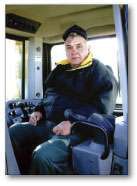 Felix Chavez, Ryan’s father, was his mentor and business partner.
Felix Chavez, Ryan’s father, was his mentor and business partner.Ryan shies away from job applicants who claim they can drive or operate anything. “I don’t want a hotshot,” he says. “I want someone who’s going take care of things and pay attention to what they’re doing.”
For example, after a truck driver passes his driving test – and many candidates bow out because of the hill handling requirements – Ryan sends them out with a seasoned driver for up to a week to experience real-life situations, such as how to handle a side dump. “We don’t just throw him out in the truck and say, ‘Here, fall in line, keep up,’” Ryan says.
“I take a personal interest in every project,” Ryan says. “I go out and check them constantly. It helps if the guys know you know what’s going on.” He also plays detective if someone reports a problem on a job. “Instead of saying ‘so and so says this’ I go out and check it myself.”
Do right
“My father and I basically built the company by trying to do right by our employees and by our customers. Being honest, and making sure the jobs we do are the best that could be done. Our triangle logo is basically a reminder for me of what’s got us here and what’s going to keep us here: honesty, integrity and quality.”
Although he passed on some college scholarships to form FC&SC with his father, Ryan knew it was the right choice from the beginning. “Since I was little, this is all I’ve ever wanted to do. I pretty much live and breathe construction.”
It’s a profession he wishes generated more respect. “Some people drive down a road their entire life and they don’t realize the engineering that went into it, all the planning that took place to make it happen.”
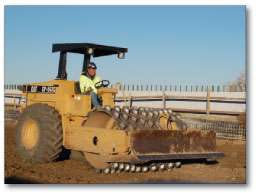 FC&SC received a subcontract on I-25 work in Trinidad, partially funded by stimulus money.
FC&SC received a subcontract on I-25 work in Trinidad, partially funded by stimulus money.Over the years, FC&SC has had to dip and weave with the markets, and Ryan expects no less in the future. “We’re looking at oil field maintenance, since the drilling side of things will eventually come to an end,” Ryan says.
But there’s one overriding consideration when Ryan looks at the future. “My dad always taught me if the company you’re working for doesn’t make money, you’re not going to make money,” Ryan says. “I still feel his presence. I know what he expects of me and the company, and I’d liked to see that passed along to my sons.” EW




